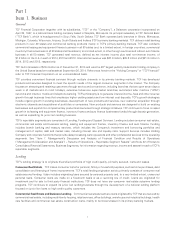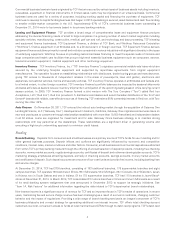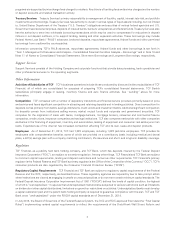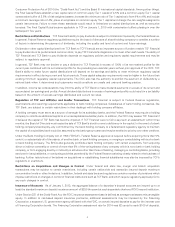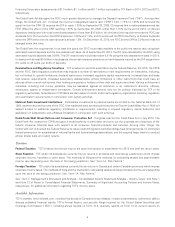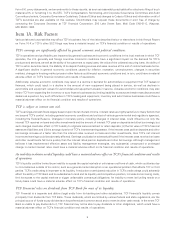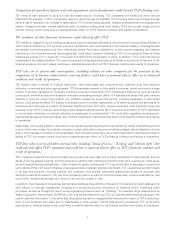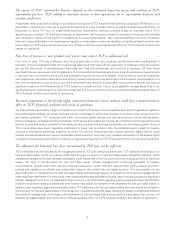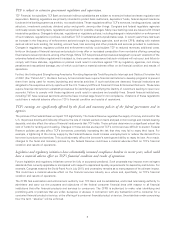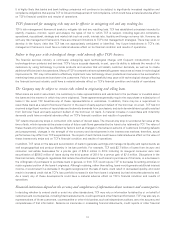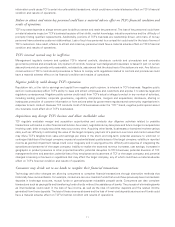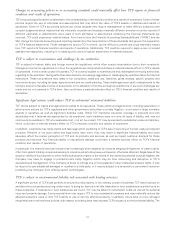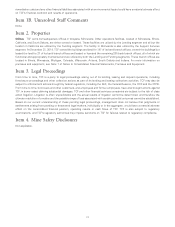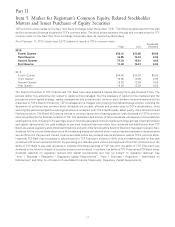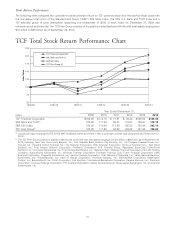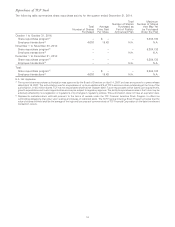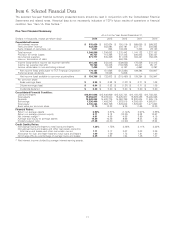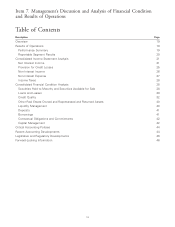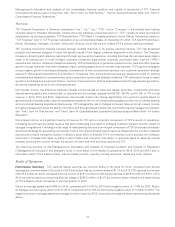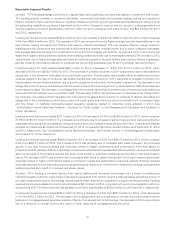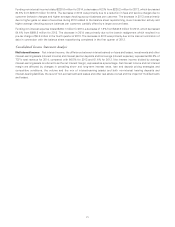TCF Bank 2014 Annual Report Download - page 24
Download and view the complete annual report
Please find page 24 of the 2014 TCF Bank annual report below. You can navigate through the pages in the report by either clicking on the pages listed below, or by using the keyword search tool below to find specific information within the annual report.information could cause TCF to enter into unfavorable transactions, which could have a material adverse effect on TCF’s financial
condition and results of operations.
Failure to attract and retain key personnel could have a material adverse effect on TCF’s financial condition and
results of operations.
TCF’s success depends to a large extent upon its ability to attract and retain key personnel. The loss of key personnel could have
a material adverse impact on TCF’s business because of their skills, market knowledge, industry experience and the difficulty of
promptly finding qualified replacements. Additionally, portions of TCF’s business are relationship driven, and many of its key
personnel have extensive customer relationships. Loss of such key personnel to a competitor could result in the loss of some of
TCF’s customers. As a result, a failure to attract and retain key personnel could have a material adverse effect on TCF’s financial
condition and results of operations.
TCF’s internal controls may be ineffective.
Management regularly reviews and updates TCF’s internal controls, disclosure controls and procedures and corporate
governance policies and procedures. Any system of controls, however well designed and operated, is based in part on certain
assumptions and can provide only reasonable, not absolute, assurances that the objectives of the system are met. Any failure or
circumvention of TCF’s controls and procedures or failure to comply with regulations related to controls and procedures could
have a material adverse effect on its financial condition and results of operations.
Negative publicity could damage TCF’s reputation.
Reputation risk, or the risk to earnings and capital from negative public opinion, is inherent in TCF’s business. Negative public
opinion could adversely affect TCF’s ability to keep and attract employees and customers and expose it to adverse legal and
regulatory consequences. Negative public opinion could result from TCF’s actual or alleged conduct in any number of activities,
including lending practices, corporate governance, regulatory compliance, mergers and acquisitions, disclosure, sharing or
inadequate protection of customer information or from actions taken by government regulators and community organizations in
response to such conduct. Because TCF conducts most of its businesses under the ‘‘TCF’’ brand, negative public opinion about
one business could affect all of TCF’s businesses.
Acquisitions may disrupt TCF’s business and dilute stockholder value.
TCF regularly evaluates merger and acquisition opportunities and conducts due diligence activities related to possible
transactions with banks or other financial institutions. As a result, negotiations may take place and future mergers or acquisitions
involving cash, debt or equity securities may occur at any time. Acquiring other banks, businesses or branches involves various
risks, such as: difficulty in estimating the value of the target company; payment of a premium over book and market values that
may dilute TCF’s tangible book value and earnings per share in the short- and long-term; potential exposure to unknown or
contingent liabilities of the target company; exposure to potential asset quality issues of the target company; volatility in reported
income as goodwill impairment losses could occur irregularly and in varying amounts; difficulty and expense of integrating the
operations and personnel of the target company; inability to realize the expected revenue increases, cost savings, increases in
geographic or product presence or other projected benefits; potential disruption to TCF’s business; potential diversion of TCF
management’s time and attention; potential loss of key employees and customers of TCF or the target company; and potential
changes in banking or tax laws or regulations that may affect the target company, any of which could have a material adverse
effect on TCF’s financial condition and results of operations.
Consumers may decide not to use banks to complete their financial transactions.
Technology and other changes are allowing consumers to complete financial transactions through alternative methods that
historically have involved banks. For example, consumers can now maintain funds that would have previously been held as bank
deposits in brokerage accounts, mutual funds or general-purpose reloadable prepaid cards. Consumers can also complete
transactions such as paying bills and transferring funds directly without the assistance of banks. The process of eliminating banks
as intermediaries could result in the loss of fee income, as well as the loss of customer deposits and the related income
generated from those deposits. The loss of these revenue streams and the loss of lower-cost deposits as a source of funds could
have a material adverse effect on TCF’s financial condition and results of operations.
11


